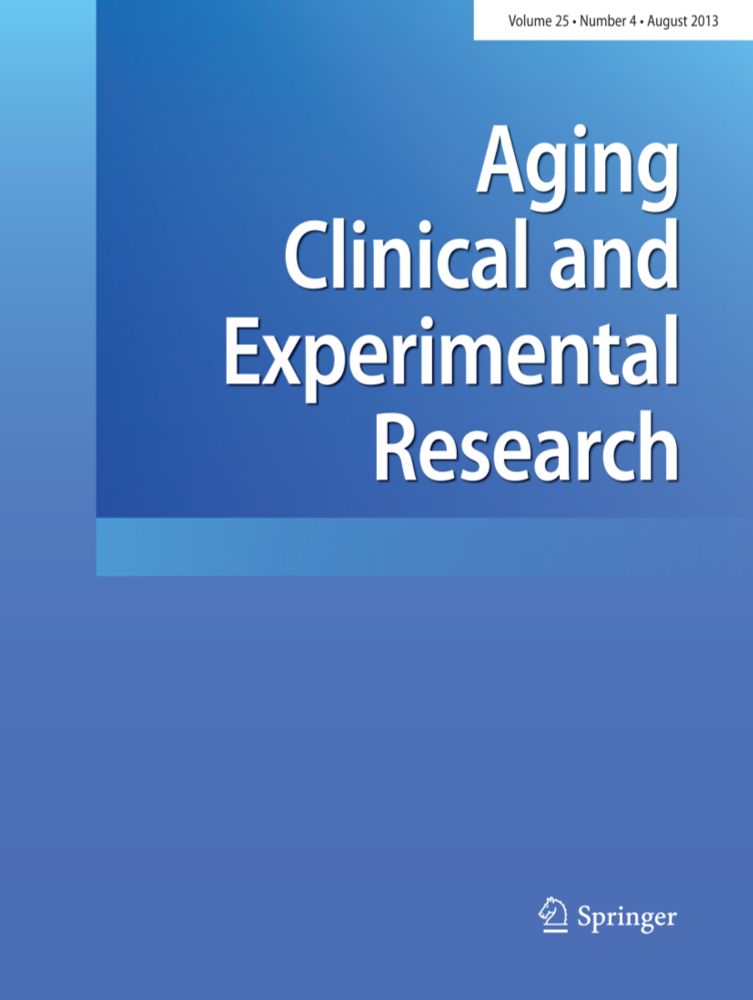
Laughing During Conversations, But Not in Response to Digital Media, Is Associated With Less Loneliness, Social Isolation, and Social Withdrawal: A Cross‐Sectional Study of German Adults in 2023
Background and Aims Due to the limited knowledge in this study area, we aimed to investigate the association of frequency of laughter with loneliness, social isolation (perceived and objective socia...
New publication: #Laughing During #Conversations, But Not in Response to Digital Media, Is Associated With Less #Loneliness, Social #Isolation, and Social #Withdrawal: A Cross-Sectional Study of German Adults in 2023 onlinelibrary.wiley.com/doi/10.1002/...
@hche-uhh.bsky.social
28.10.2025 11:35 — 👍 1 🔁 0 💬 0 📌 0
Long-Term Care Facilities by Design: The Different Preferences of Location, Features, and Policies of LTC Facilities Among Lesbian, Gay, Bisexual, and Heterosexual Adults in Germany
This study explored the preferences about features, policies, and location of long-term
care (LTC) facilities among cis- and transgender individuals with different forms
of sexual orientation, that is...
New publication: Long-Term Care Facilities by Design: The Different Preferences of Location, Features, and Policies of LTC Facilities Among Lesbian, Gay, Bisexual, and Heterosexual Adults in Germany
www.jamda.com/article/S152...
07.10.2025 15:06 — 👍 1 🔁 0 💬 0 📌 0

Determinants of Patient Use of Tele#MentalHealth Services: Representative Cross-Sectional Survey From Germany
Background: Tele#MentalHealth services effectively address major challenges in #MentalHealthcare delivery. To maximize the potential of the services, it is essential to facilitate patient use and reduce use disparities. Nevertheless, determinants of patient use of tele#MentalHealth services have been scarcely investigated thus far. Objective: We aimed to identify determinants of patient use of tele#MentalHealth services since the onset of the COVID-19 pandemic and currently. Methods: In December 2023, we conducted a cross-sectional, quota-based (gender and age group) online survey. The sample comprised individuals aged 18 to 74 years, who had been using #MentalHealth services since March 2020 (n=2,082). Tele#MentalHealth services use was assessed using items that inquired whether individuals had used the services since March 2020 or currently (in the last four weeks). Logistic regressions were computed to test the associations of socioeconomic, access, #Health, COVID-19-related, psychosocial, and service factors as well as personality, and provider characteristics with patient use. Results: Younger age, a more positive patient attitude towards tele#MentalHealth services, a more positive provider attitude towards and higher provider skills for using the services were positively associated with patient use of tele#MentalHealth services since the onset of the COVID-19 pandemic. When exclusively looking at current use, positive associations with full-time employment, lower neuroticism, a more positive provider attitude towards the services, and use of the services to avoid stigmatization, long waiting times, or inconvenient scheduling were observed. Access, #Health, and COVID-19-related factors were not associated with patient use (since the onset of the COVID-19 pandemic and currently). Conclusions: Beyond socioeconomic factors, personality and a positive patient attitude towards the services, patient use of tele#MentalHealth services was associated with a positive provider attitude towards and skills for using the services, which underscores the need for provider support and training in tele#MentalHealthcare. Furthermore, avoiding stigmatization and higher convenience of the services were associated with patient use, which highlights the substantial potential of the services to address current #MentalHealthcare challenges.
JMIR Mental Health: Determinants of Patient Use of Tele#MentalHealth Services: Representative Cross-Sectional Survey From Germany #TelePsychologie #PsychischeGesundheit #MentalHealthDeutschland #Telemedizin #COVID19Psychologie
13.06.2025 19:02 — 👍 1 🔁 1 💬 0 📌 0

Determinants of Patient Satisfaction With Tele#MentalHealth Services in Germany: Representative Cross-Sectional Postpandemic Survey Study
Background: Increasing patient satisfaction with tele#MentalHealth services is crucial for promoting widespread implementation and ensuring consistent utilization rates in the future, where the services could be a beneficial addition to routine #MentalHealthcare. Nevertheless, knowledge regarding determinants of patient satisfaction with tele#MentalHealth services is very limited. Objective: This study aimed to identify determinants of patient satisfaction with tele#MentalHealth services. Methods: A cross-sectional, quota-based (quotas: gender and age group) online survey was conducted in December 2023 in Germany. The sample included individuals aged 18-74 years who had received tele#MentalHealth services since March 2020 (n=854). Patient satisfaction with video, telephone, and asynchronous services was measured using the Telemedicine Satisfaction Questionnaire or the Client Satisfaction Questionnaire adapted to Internet-based interventions. The association of socioeconomic, access, #Health, psychosocial, personality, and COVID-19-related factors, as well as patient preferences and provider characteristics with patient satisfaction, was tested using multiple linear regressions. Results: A positive patient attitude towards tele#MentalHealth services and greater fear of COVID-19 as well as a positive and open provider attitude and higher provider skills for using the services were positively associated with patient satisfaction in all service groups (P
JMIR Mental Health: Determinants of Patient Satisfaction With Tele#MentalHealth Services in Germany: Representative Cross-Sectional Postpandemic Survey Study #Telemedizin #PsychischeGesundheit #Patientenzufriedenheit #OnlineTherapie #Telepsychologie
29.05.2025 20:08 — 👍 1 🔁 1 💬 0 📌 0

Determinants of Having Online Health Consultations During the #covid19 Pandemic Among Middle-Aged and Older Adults in Germany: Representative Longitudinal Survey Study
Background: During the #covid19 pandemic, telemedicine services represented a widely implemented alternative to in-person doctor and therapist appointments. Consequently, rates of telemedicine use rapidly increased worldwide, also in Germany. Research regarding longitudinal determinants of telemedicine use is needed, particularly from nationally representative German samples, to improve understanding of the use behavior of major target groups such as middle-aged and older adults. Objective: Therefore, this study aimed to longitudinally investigate determinants of online health consultation use among middle-aged and older individuals during the #covid19 pandemic in Germany. Methods: Nationally representative longitudinal data of German middle-aged and older adults (≥46 years old) were taken from the German Ageing Survey (DEAS). Data from the Compact Survey (conducted between June and July 2020) and wave 7 (conducted between November 2020 and March 2021) of the DEAS were observed (pooled analytic sample n=5,456). Having experienced consultations with doctors or therapists on online platforms served as the outcome measure. Associations with socioeconomic, health- and health behavior-related, psychological, and #covid19-related determinants were tested using random effects logistic regressions. Results: In our sample, 49% were female and the mean age of the participants was 67.8 years (SD=9.4). Past experience with online health consultations was reported by 10.3% of the sample. Online health consultation use was associated with high education (OR 1.43, 95% CI 1.06-1.93, p=.019), poor self-rated health (OR 0.60, 95% CI 0.49-0.75, p
New in JMIR Aging: Determinants of Having Online Health Consultations During the #covid19 Pandemic Among Middle-Aged and Older Adults in Germany: Representative Longitudinal Survey Study #Telemedizin #Gesundheit #ÄltereMenschen #COVID19 #OnlineBeratung
26.05.2025 21:03 — 👍 1 🔁 1 💬 0 📌 0

"Die Einsamkeit ist anders, seit mein Mann tot ist", sagt Carolina, 35
Für den Schwerpunkt in unserer April-Ausgabe haben wir junge Menschen in Hamburg gefragt, wann sie einsam sind und was sie dagegen tun:
www.hinzundkunzt.de/schwerpunkt-...
02.04.2025 13:21 — 👍 4 🔁 2 💬 0 📌 0
Research on well-being & loneliness in education | Osnabrück University, Department of Education and Cultural Sciences.
Sociologist, PostDoc at TU Dortmund
https://sag.sowi.tu-dortmund.de/professur/team/alina-schmitz
Topics: inequalities in health and well-being, lifecourse, ageing, gender, social policy
Das Hamburger Straßenmagazin. Kaufen, lesen, helfen!
www.hinzundkunzt.de
EuroQol’s vision is to improve decisions about health and health care throughout the world by developing, promoting and supporting the use of instruments (with the widest possible applicability) for the measurement and valuation of health.
Psychologist...human-animal relationships, ethics, the impact of pets on human health, writer. Blogs for Psychology Today https://www.psychologytoday.com/us/blog/animals-and-us
Health Services Research, Health and Nursing Science. Nurse, Paramedic.
Germany’s largest population based cohort study. Its aim is to investigate the causes for the development of major chronic diseases.
▶︎ nako.de
DZNE (Deutsches Zentrum für Neurodegenerative Erkrankungen) researches diseases of the brain and the nervous system, such as #Alzheimer's, #Parkinson's and #ALS. Mandatory:
dzne.de/en/imprint - dzne.de/en/data-protection/
Professor of Public Health (Prevention and Health Promotion), Uni Bremen. Co-Speaker, Leibniz ScienceCampus Digital Public Health (https://www.digital-public-health.de/). Health behaviour and health inequalities. Posts in German and English.
Die Nationale Demenzstrategie wurde unter der Federführung des Bundesministerums für Familie, Senioren, Frauen und Jugend und des Bundesministeriums für Gesundheit gefördert und entwickelt.
Psychology postdoc, studies how well-being and health change as we grow older.
Economist @ DIW Berlin. Public Economics, Pensions, Long-Term Care
Sociologist interested in unpaid care, paid work & gender. Researcher @ German Centre of Gerontology (DZA). Ph.D. from BIGSSS.
Professor of Applied Health Psychology Leeds Beckett University. Positive on the mountain. Mum to Razzie the border terrier.
Associate Professor of Applied Health Research, University of Leeds | utilising patient reported data #proms | cancer | health data | NIHR Research Support Service & Methodology Incubator https://medicinehealth.leeds.ac.uk/medicine/staff/63/dr-kate-absolom
Sociologist | Interim director at German Centre of Gerontology (DZA) | interested in inequalities, volunteering and participation, work and retirement
Das KNE möchte einen substantiellen Beitrag zur Vorbeugung und Linderung von Einsamkeit leisten. Ein Projekt des Instituts für Sozialarbeit und Sozialpädagogik e.V. gefördert durch das BMFSFJ.
www.kompetenznetz-einsamkeit.de
The Institute for Health Services Research in Dermatology and Nursing (IVDP) at the University Medical Center Hamburg-Eppendorf (UKE) encompasses research in dermatology, health economics, patient outcomes, nursing and midwifery and provides clinical care.
I work at the School of #HealthSciences, University of Dundee
Measurement, (health-related) quality of life #HRQL, multimorbidity, #ResearchEthics, publishing, #PeerReview, research assessment
Ex- #REF2021, former #NightshiftEditor
No DMs due to UK-OSA.
















